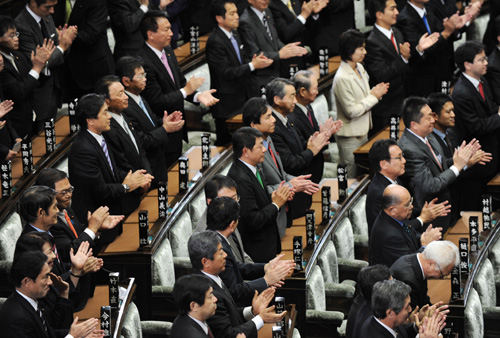|
 |
|
WELCOMED DISSOLUTION: Members of the lower house of the Japanese parliament applaud during a meeting in Tokyo on November 16. Japan's Prime Minister Yoshihiko Noda dissolved the chamber that day, paving the way for a December election (XINHUA/AFP) |
Japanese Prime Minister Yoshihiko Noda had no choice but to dissolve the House of Representatives on November 16, following criticism of his economic and diplomatic policies during the past year. In the aftermath, a political fight is on in Japan's highest levels of government.
Chinese observers analyze that it will be very difficult for any single party to win a majority in the upcoming election on December 16, owing to Japan's complicated political process. Furthermore, whoever comes out ahead will continue to face economic and diplomatic pressures in the midst of worsening relations between China and Japan.
Noda's choice
The economic and diplomatic policies of Noda and his Democratic Party of Japan (DPJ) have failed to satisfy the Japanese people. To avoid past humiliations, Noda declared that he had delivered on his promise to dissolve the House of Representatives, in a bid to rebuild people's trust in politics.
Noda said problems stemming from the earthquake recovery and nuclear accident of 2011, as well as the struggling economy, are still not resolved completely. Whether to give up halfway or to finish the job will be decided by the country's voters, he said.
"I dissolved the lower house because I pledged that I will stake my political life on carrying out the comprehensive reform of social security and rebuilding the tax system, and I lived up to my promise today," he said at a press conference after the dissolution of parliament.
Noda's decision was painful but strategic, because he hoped to choose a good time to ensure that the DPJ would get as many parliament seats as possible, said Liu Junhong, a researcher with the China Institutes of Contemporary International Relations. This was the 24th dissolution of the lower house of the Japanese parliament since World War II.
In recent months, Noda's approval rating has been on the decline. Before the dissolution, Noda's approval rating had dropped to its lowest point since he took office. According to the latest poll released by the Yomiuri Shimbun newspaper on November 18, the approval rating of Noda's cabinet was only 24 percent, while the disapproval rating hit 65 percent.
The DPJ has been the ruling party since August 2009, after which it produced a series of ambitious plans. During the past 40 months, Japan has been under the administration of three different DPJ prime ministers, and has fulfilled only about 30 percent of its promises from the last election.
Pang Zhongpeng, a researcher on Japanese studies with the Chinese Academy of Social Sciences, pointed out that Japan's national strength has rapidly decreased during the DPJ's administration. "Japan now has completely declined to a second-class country in the world," Pang said.
Japan has undergone severe crises in the past 40 months, such as the earthquake in March 2011 and the following radiation leaks, which created huge economic losses and damaged the image of Japanese products' quality. Famous Japanese household electronics brands like Sharp, Sony and Panasonic saw declining sales, while the country's national debt skyrocketed to 240 percent of its GDP, driving Japan's economy to the edge of collapse. Right-wing forces and extreme nationalists have gained popularity. Moreover, the country's hard-line diplomatic policies created tensions in the world, especially between Japan and its neighbors.
Noda's sudden dismissal of the lower house was targeted at protecting the DPJ's seats in the parliament, said Liu. Previously, the Noda administration has been wrestling with the Liberal Democratic Party (LDP) over the question of dissolving the parliament. In October, Noda listed three preconditions for dismissing the parliament: passing a special bond bill and an electoral reform bill, and holding a conference to discuss pension system reform. Liu added that as the parliament passed the bill of issuing deficit-covering national bonds on November 15, and the two major parties of Japan started discussing reforms, Noda's preconditions were basically fulfilled.
Japan's future
Although the LDP is confident about a historic opportunity ahead of the coming election, observers predicted that there is only a slight chance that a single party can win a majority in the election.
| 